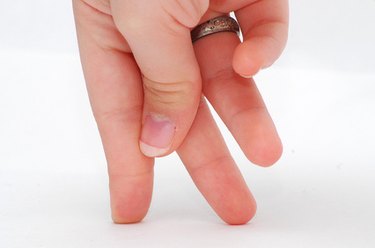
There are a slew of reasons to incorporate finger exercises in your daily workout routine. Sports such as rock climbing and rowing require athletes to maintain a strong grip. Strong finger muscles also can help for people with arthritis or other debilitating conditions that affect their hands. People who have had hand surgery or finger-joint replacement also need to incorporate exercises into their rehabilitation routines, according to doctors at the Mayo Clinic. Typists and guitar players benefit from strong fingers, too.
Step 1
Squeeze a tennis ball to build finger muscles. You also can use any number of stress balls on the market, as long as they are large enough to put significant pressure on your fingers when you squeeze. Wrap your fingers around the ball, and squeeze as hard as you can for 5 seconds. Release and repeat for 10 repetitions.
Video of the Day
Step 2
Do push-ups on the tips of your fingers instead of with your entire hands. Whether you do a full-body push-up on the tips of your toes or a modified push-up while kneeling, use only your fingertips to support your weight as you lower your body. Push your body so your arms are fully extended and you feel the pressure on your fingers.
Step 3
Use the finger muscles to do repetitions of finger curls when you have nerve damage or need stronger hands, according to doctors at the American Academy of Orthopaedic Surgeons. Extend your arms straight in front of you, with your palms facing up. Curl your fingers and wrists upward toward your body, release your fingers, and press your hands down toward the ground. With your fingers still extended, bend your elbows up. Release and repeat the process for 10 reps.
Step 4
Splay your fingers as you place your hand face-down on a table. Raise the index finger only, and hold for 5 seconds. Release it, then move through each of the other fingers in similar fashion. Raise each finger and the thumb 10 times each. Do 10 repetitions often throughout the day if you are rehabilitating from a hand procedure or injury.
Things You'll Need
Tennis ball
Ergonomic hand tools
Tip
People at risk for carpal tunnel syndrome, such as keyboardists and others who do repetitive-motion work, should include finger exercises to keep them strong so the ulnar nerve doesn't move out of place and cause pain. A strong tunnel can help prevent pain caused by repetitive motion.
Warning
No matter how strong your fingers are, you must practice hand safety to avoid injuries to the fingers, according to doctors at the American Society for Surgery of the Hand. Take regular breaks from repetitive-motion activities, use the proper ergonomic tools for the job, and use the correct hand and wrist position when performing a task.
Video of the Day
- Mayo Clinic: Trigger finger
- Sports Injury Bulletin: Finger Exercises
- American Academy of Orthopaedic Surgeons: Finger Curls
- American Society for Surgery of the Hand: Hand Safety in the Garden
- Nimble Fingers: Typing Games to Strengthen Fingers
- Ohio State University Medical Center: Hand and Finger Exercises